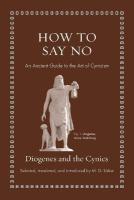
Princeton (2022) h/b 219pp £14.99 (ISBN 9780691229850)
‘Cynicism’ derives from the ancient Greek kuôn, ‘dog’. It was used by Diogenes (c. 410-320 BC) and his many followers to refer to their dog-like shamelessness, i.e. their preference for living in accordance with nature rather than custom. He was and remains a highly controversial figure: as John Moles put it ‘Ancient and modern reactions range from appreciation of his wit to admiration for his supposed integrity, anxiety to integrate him into a formal philosophical succession from Socrates to the stoics, denial of his philosophical significance, revulsion at his shamelessness, dislike of the threat he posed to conventional social and political values and doomed attempts to make him respectable.’
Typical examples of Diogenes’ utterances and reactions to him include:
He used to enter the theatre, walking against the flow of people exiting. When asked why, he replied, ‘I've been pursuing this course of action my entire life’.
After observing a child drink water from his hands, he hurled his cup from his knapsack, saying ‘A child has vanquished me in simplicity’.
To someone who asked at what hour one should eat lunch, he said ‘If rich, whenever you want to, if poor, whenever you can’.
He once begged from a statue. When asked why he was doing so, he replied, ‘To get practice at being refused’.
When asked what kind of wine he enjoyed drinking, he replied, ‘Somebody else’s’.
When he was asked why people give to beggars but not to philosophers, he said ‘Because people expect they might become lame or blind, but never that they’ll become philosophers’.
When someone ask Plato ‘What sort of person does Diogenes seem to you?’, he replied ‘Socrates gone insane’.
By contrast, Seneca, while agreeing that Stoics should live in accordance with Nature, went on ‘But to torture one’s own body, despise basic cleanliness, to seek squalor and eat food that is not only vile but putrid and disgusting, is contrary to nature’.
U., the Lyman-Roberts professor of classical languages and literature at the University of Vermont, introduces the selection by suggesting that, in the absence of any systematic doctrines, the cynics could be seen more as what we might call ‘lifestylists and performance artists’ than philosophers, and goes on to argue that a number of their concerns matches well with contemporary reactions against technology, misuse of resources, abuse of nature and the idea that economic development is the key to happy living. It is not clear to this reviewer how these very modern concerns, arising from a modern economy, relate to the ancient cynics.
But that is not to dispute the excellence of U.’s selection of texts, with the Greek and Latin on the facing pages, that introduces his subject—the biographer Diogenes Laertius’ life of Diogenes (no relation), the stoic Seneca (who disapproves of cynic arrogance but praises their simplicity and frugality), pseudo-Crates’ letter to Hipparchia (and his tips for training up a cynic baby), Lucian’s life of his cultured cynic teacher Demonax, Strabo’s account of a meeting between the cynic Onesicritus and a band of Indian ‘naked philosophers’, Dio of Prusa’s description of Diogenes attending the Isthmian games, (pseudo-?) Lucian’s interview with a cynic, the pagan emperor Julian’s appreciation of Diogenes’ commitment to philosophical reflection and the Christian Theodoret’s life of the holy fool Symeon Stylites, which at times reflected that of some of the Old Testament prophets.
This fascinating, well-translated selection admirably exemplifies the multi-faceted nature of the cynic way of life and is thoroughly recommended.
Peter Jones
